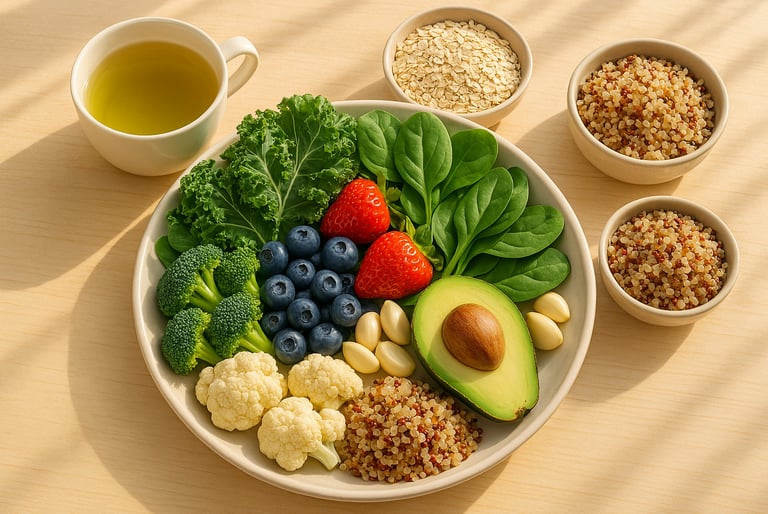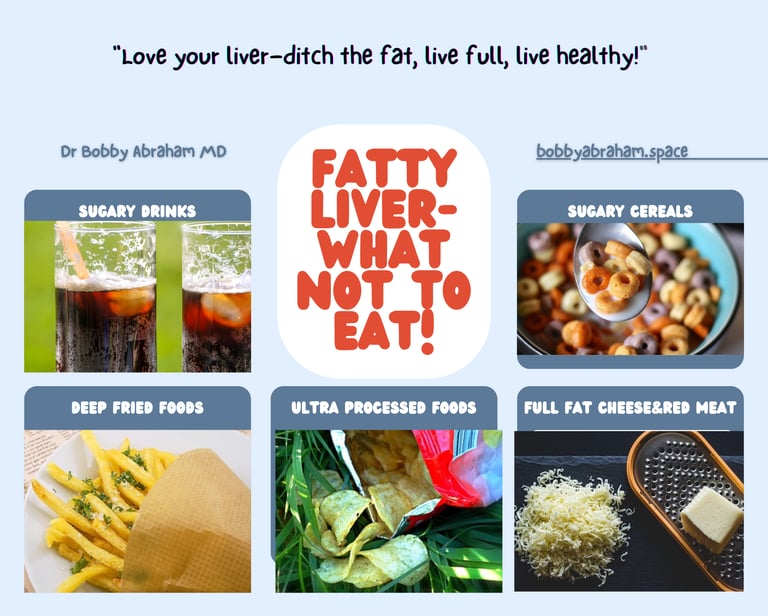Best Foods for Fatty Liver: What to Eat for a Healthier Liver
A comprehensive guide to evidence-based dietary choices that support liver health and help manage fatty liver disease effectively


As a physician, one of the most common—and often overlooked—conditions I encounter in my practice is fatty liver disease. It sneaks up silently, often found during routine ultrasounds or liver function tests. Whether it's Non-Alcoholic Fatty Liver Disease (NAFLD) or Alcohol-Related Liver Disease, the underlying inflammation and fat buildup in liver cells can lead to serious complications like cirrhosis, liver failure, or even liver cancer if left unchecked.
The best part? Your liver is remarkably resilient. With the right changes, especially in your diet, you can often reverse fatty liver. Today, let’s explore what a proper fatty liver diet plan looks like and which foods are good for liver health.
Understanding Fatty Liver
Fatty liver disease occurs when liver cells accumulate fat with or without accompanying inflammation. There are two main types:
NAFLD – seen in people who drink little or no alcohol.
Alcoholic fatty liver disease (AFLD) – linked to excessive alcohol intake.
Both types have similar dietary needs when it comes to healing and liver support.
Why Diet Matters So Much
Unlike medications that often come with side effects, food is a gentle healer. The liver is central to metabolism, detoxification, and nutrient storage. Every bite you take can either fuel liver inflammation or help heal it. A liver-friendly diet lowers fat buildup, reduces insulin resistance, and curbs oxidative stress.
As a doctor, I often tell my patients: Your liver is like your body’s kitchen—it works nonstop to break down, filter, and prepare the nutrients your body needs. Treat it with kindness.
Best Foods for Fatty Liver – What to Include
Here’s a look at the best foods good for liver health and how they support your recovery:
1. Leafy Greens
Spinach, kale, arugula, and collards are powerhouses of chlorophyll and antioxidants. They help reduce liver enzymes and bind to toxins.
🩺 Doctor’s Tip: Try sautéed spinach with garlic in olive oil as a simple, liver-loving side dish.
2. Cruciferous Vegetables
Broccoli, cauliflower, and Brussels sprouts are rich in sulfur compounds that enhance liver detox pathways and reduce fat buildup.
3. Fatty Fish
Salmon, sardines, and mackerel are high in omega-3 fatty acids which reduce liver fat and inflammation.Reduce the oil during preparation of fish,so that your body enjoys the benefits therein.
🩺 Doctor’s Tip: Aim for two servings per week. Grilled or baked, not fried.
4. Oats and Whole Grains
High in fiber and low on the glycemic index, oats help improve insulin sensitivity and support weight loss—two key goals in fatty liver treatment.
✅ Bonus: Beta-glucans in oats help lower LDL cholesterol and modulate cardiovascular risk too.
5. Nuts and Seeds
Walnuts, flaxseeds, and sunflower seeds contain healthy fats and antioxidants. Walnuts in particular have been linked to improved liver enzymes in people with NAFLD.
🩺 Portion alert: Nuts are calorie-dense. A small handful a day is enough.
6. Green Tea
Loaded with catechins, green tea improves liver fat metabolism and lowers oxidative stress. Regular consumption has been associated with lower ALT and AST levels.
7. Olive Oil
Extra virgin olive oil is a cornerstone of the Mediterranean diet. It’s rich in anti-inflammatory monounsaturated fats and polyphenols that reduce liver enzyme levels and improve insulin sensitivity.
🩺 Doctor’s Tip: you may use it as your primary cooking oil.
8. Avocados
Packed with fiber, healthy fats, and glutathione, avocados support liver detoxification and help lower inflammation.
🥑 Plus, they’re delicious and versatile—use them in salads, smoothies, or as a spread.
9. Garlic
This pungent bulb boosts liver enzymes that help detoxify the body. It may also reduce liver fat and body weight.
🧄 Don’t like it raw? Add minced garlic to soups, sauces, or stir-fries.
10. Berries
Blueberries, strawberries, and raspberries are rich in polyphenols and anthocyanins—compounds that protect liver cells from oxidative stress and inflammation.
🍓 A daily serving of berries can do wonders for your gut and liver.
What to Avoid: Foods That Worsen Fatty Liver
Just as certain foods heal, others harm. A fatty liver diet plan must also eliminate or minimize liver-damaging foods.Avoid these to the maximum possible extend
🚫 Sugary Beverages
Sodas, sweetened teas, and fruit juices spike blood sugar and promote fat deposition in the liver.
🧪 Fructose (found in sugary drinks) is one of the biggest dietary drivers of NAFLD.
🚫 Refined Carbs
White bread, pasta, and pastries quickly convert into glucose, fueling liver fat buildup.
🍞 Opt for whole grain versions instead.
🚫 Processed Foods
Packaged snacks, chips, and ready-to-eat meals often contain trans fats and high sodium—both inflammatory.
🚫 Alcohol
Even moderate drinking can worsen fatty liver, especially in NAFLD.
🩺 Doctor’s Advice: Eliminate alcohol completely if you have fatty liver.
🚫 Red and Processed Meats
High saturated fat content makes them harder for the liver to process.
🍗 Instead, go for lean poultry or plant-based proteins like legumes and tofu.
A Sample Fatty Liver Diet Plan
Here’s a simple one-day liver-friendly meal plan:
🥣 Breakfast:
Steel-cut oats with chia seeds, blueberries, and a dash of cinnamon
Green tea
🥗 Lunch:
Grilled salmon on a bed of spinach and kale with cherry tomatoes, cucumbers, olive oil, and lemon
Whole grain roll
🍏 Snack:
A small handful of walnuts and a sliced apple
🍲 Dinner:
Stir-fried broccoli and tofu with garlic and olive oil
Quinoa or brown rice
🍵 Evening:
Herbal tea or another cup of green tea
Lifestyle Tips to Complement Your Diet
Diet alone isn’t enough—you must pair it with these lifestyle changes:
1. Exercise Regularly
Aim for at least 150 minutes of moderate aerobic exercise weekly. It reduces liver fat even without weight loss.
2. Manage Weight
Obesity is a modern day epidemic and is an indepentant risk factor for almost all lifestyle diseases.Studies have shown that losing 7–10% of your body weight can significantly reduce liver fat.
3. Control Diabetes and Cholesterol
Non alcoholic fatty liver often coexists with metabolic syndrome and is a possible component in the cluster of metabolic syndrome. . Regularly check your blood sugar, lipids, and liver function and keep in track your overall health, and in turn your liver will thank you.
4. Hydrate Well
Adequqte water intake is essential to maintain good health and to improve renal function,aid in digestion and helps flush out toxins from the body.
5. Sleep Better
Sleep is the time when our body enters into repair mode. With complex metabolic adjustments which regulate human health is thought to happen during a good sleep. Poor sleep is linked to insulin resistance and accumulation of liver fat. Aim for 7–8 hours of sleep per night.
Final Thoughts from a Doctor
As someone who regularly sees patients struggling with fatigue, abdominal discomfort, or metabolic syndrome, I want to stress that fatty liver is reversible—with the right choices.
What you eat can either burden or heal your liver. Focus on natural, unprocessed, whole foods, and make small, consistent changes. You don’t need fancy supplements or detox kits—just a sustainable fatty liver diet plan that includes proven foods good for liver health.
Your liver works hard for you. It’s time you return the favor.
FAQs
Q: Can fatty liver be completely reversed with diet?
A: Yes. Especially in the early stages, fatty liver can be reversed with proper diet, exercise, and weight loss.
Q: How long does it take to reverse fatty liver?
A: Significant improvements can be seen in as little as 6–12 weeks with lifestyle changes.
Q: Are coffee and turmeric good for the liver?
A: Yes. Coffee has antioxidant properties that reduce fibrosis, and turmeric (especially curcumin) may help reduce liver inflammation.
Your Liver Deserves Better. Start Today.
If you’ve been diagnosed with fatty liver, don’t panic. Use this post as a practical guide. Share it with friends or family who might benefit. Small dietary changes can help healing your ailing liver.
Dr. Bobby Abraham, MD – Internal Medicine & Lifestyle Advocate


